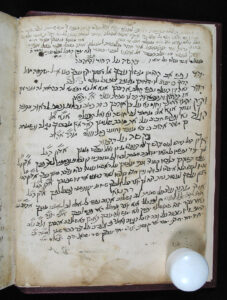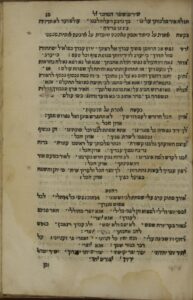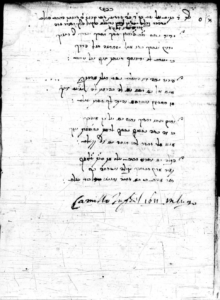| Source (Hebrew) | Translation (English) |
|---|---|
יְדִיד נֶֽפֶשׁ אָב הָרַחֲמָן, מְשׁוֹךְ עַבְדְּךְ אֶל־רְצוֹנֶֽךָ, יָרוּץ עַבְדְּךָ כְּמוֹ אַיָּל, יִשְׁתַּחֲוֶה אֶל מוּל הֲדָרֶֽךָ, יֶעֱרַב לוֹ יְדִידוּתֶֽיךָ, מִנֹּֽפֶת צוּף וְכׇל־טָֽעַם׃ |
You who love my soul Compassion’s gentle source, Take my disposition and shape it to Your will. Like a darting deer I will flee to You. Before Your glorious Presence Humbly I do bow. Let Your sweet love Delight me with its thrill Because no other dainty Will my hunger still. |
הָדוּר נָאֶה זִיו הָעוֹלָם, נַפְשִׁי חוֹלַת אַהֲבָתֶֽךָ, אָנָּא אֵל־נָא רְפָא נָא לָהּ, בְּהַרְאוֹת לָהּ נֹֽעַם זִיוֶֽךָ, אָז תִּתְחַזֵּק וְתִתְרַפֵּא, וְהָֽיְתָה לָּהּ שִׂמְחַת עוֹלָם׃ |
How splendid is Your light Which worlds do reflect! My soul is worn from craving For Your love’s delight. Please, good God, do heal her[1] cf. Numbers 12:13. And show to her Your face, So my soul can see You And bathe in Your grace. There she will find strength And healing in this sight. Her joy will be complete then Eternal her delight. |
וָתִיק יֶהֱמוּ רַחֲמֶֽיךָ, וְחוּסָה נָּא עַל בֵּן אֲהוּבֶֽךָ, כִּי־זֶה כַּמָּה נִכְסוֹף נִכְסַֽפְתִּי, לִרְאוֹת בְּתִפְאֶֽרֶת עֻזֶּֽךָ, אֵֽלֶּה חָמְדָה לִבִּי, וְחֽוּסָה נָּא וְאַל תִּתְעַלָּם׃ |
What pity stirs in You Since days of old, my God! Be kind to me Your own child Begotten by Your love. For long and longing hours I yearned for Your embrace To see my light in Your light Basking in Your grace. My heart’s desire is To harmonize with Yours Do not conceal Your pity Hide not that light of Yours. |
הִגָּלֶה נָא וּפְרוֹס חָבִיבִי עָלַי אֶת־סֻכַּת שְׁלוֹמֶֽךָ, תָּאִיר אֶֽרֶץ מִכְּבוֹדֶֽךָ, נָגִֽילָה וְנִשְׂמְחָה בָּךְ, מַהֵר אָהוּב כִּי בָא מוֹעֵד, וְחָנֵּֽנוּ כִּימֵי עוֹלָם׃ |
Help, my Lover, spread Your canopy of peace. Enfold all human beings Give all pain surcease. Your presence on this earth plane Do make known to us And we shall respond then With song and with dance. Rush, my love, be quick, The time for love is now, Let Your gentle favor Grace us as of old… |
“Yedid Nefesh” is a piyyut first published in the Sefer Haḥaredim (1588) of Rabbi Elazar Moshe Azikri (1533-1600). The authorship of the piyyut is not completely certain. A version of the piyyut “with noteworthy text, spelling and pointing” may be found on folio 146 (verso) of Samuel b. David b. Solomon’s Commentary On the Book of Numbers (ca. 1437 CE).[2] Find Stefan C. Reif’s The Hebrew Manuscripts at Cambridge University Libraries: A Description and Introduction Cambridge: Cambridge University Press, 1997, page 93. Reif attributes Yedid Nefesh to Azkiri. Presumably, the text must have been added to the 15th century manuscript sometime after the publication of Sefer Haḥaredim. It would be very nice to see a digitized image of this manuscript page from the CUL collection! Yedid Nefesh also appears in Moscow – Russian State Library, Ms. Guenzburg 320 as the last of “a polyglot of at least 24 different items written in different stages” (find Dr. Ezra Chwat, גילוי מילתא בעלמא Giluy Milta B’alma). Yedid Nefesh appears there under the following headline: ד’ בתים של שם בן ד’ ב”ה ששמענו מפי קדוש מכבוד החכם השלם מהר”ר גדליה בן לגאון המושלם המקובל [הא]לקי כמהר”ר משה קורדוברו זצק”ל”. Ezra Chwat: “This doesn’t necessarily qualify that Gedalia Cordovero (1562–1625, son of Moshe Cordovero, ReMaK), is the author. To be precise, it attributes to him the oral transmission.” Meir Benayahu in Yosef Behiri, 1991, p.544, “asserts that this witness must have heard the poem from Gedalia Cordevero after his descent [from Safed] to Italy in 1583. This would be a full five years before Ḥaredim was written (and 17 years before [it was] published). Having been transmitted orally for some time might explain some of the variants. In any case Gedalia Cordevero and Elazar Azkari are likely to have been well acquainted.” The piyyut has appeared with a number of variations in various siddurim.
Source(s)


Yedid Nefesh (JTSA MS3541, fol.5v) yedid nefesh – sefer haḥaredim 43a (Venice 1597)

Notes
| 1 | cf. Numbers 12:13. |
|---|---|
| 2 | Find Stefan C. Reif’s The Hebrew Manuscripts at Cambridge University Libraries: A Description and Introduction Cambridge: Cambridge University Press, 1997, page 93. Reif attributes Yedid Nefesh to Azkiri. Presumably, the text must have been added to the 15th century manuscript sometime after the publication of Sefer Haḥaredim. It would be very nice to see a digitized image of this manuscript page from the CUL collection! |

“יְדִיד נֶפֶשׁ | Yedid Nefesh, a piyyut transmitted by Elazar ben Moshe Azikri (ca. 16th c.) interpretive translation by Rabbi Zalman Schachter-Shalomi” is shared through the Open Siddur Project with a Creative Commons Attribution-ShareAlike 4.0 International copyleft license.











[…] we’ll sing Yedid Nefesh in English, using Reb Zalman z”l’s singable English translation which captures much of the poetry of the Hebrew. “You who love my soul,” the song […]
[…] Nefesh (though we may sing it in English, here’s the […]
[…] Nefesh (we’ll sing it in English but this recording features the melody with Hebrew […]